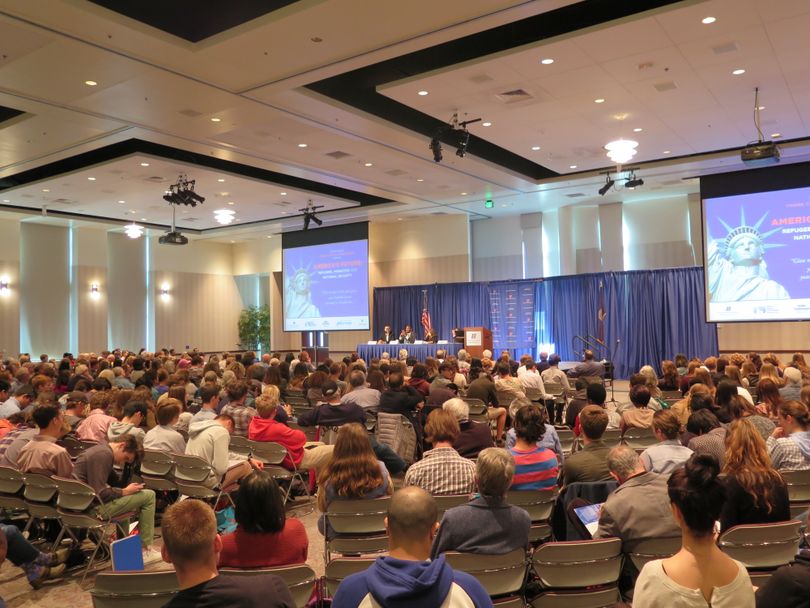Conference: Numbers, experiences behind refugee issue…

Among other comments from panelists at today’s Frank Church Conference at Boise State University, which is focusing on refugees, migration and national security:
Jennifer Sime, senior vice president for U.S. programs for the International Rescue Committee, said in the years since the U.S. refugee resettlement program was established in 1980, the highest cap for refugee admissions set for a single year was 207,000; the lowest was 67,000 in the mid-1980s. That compares to the 110,000 level set last year by then-President Obama, and the 45,000 cap set this year by President Trump.
“When people meet refugees and realize who they are, that begins to sort of change their mind,” she said.
Mohamed Abubakr, president of the African Middle Eastern Leadership Project, described how, as a 14-year-old human rights activist living in Sudan, he visited Darfur with a group of young activists, mostly college studnets. “I arrived to what looked like a documentary about the Holocaust, just in color,” he said, describing seeing thousands of mothers and children burned, “tribes completely wiped off the map, wiped off the face of the earth. And that was the source of the Sudan refugee influx, a genocide that took place.” Abubakr also saw horrifying conditions in refugee camps, and began pondering “what policies set by states translate into for the human being that is suffering … especially when you look at children who are waiting years and years. … Most of them wait decades before they get the chance to be resettled anywhere in the world. It’s just disturbing to see.”
Abubakr said he moved to the U.S. about 18 months ago to start his new organization. “I got to see the source where these policies are made. It’s just absurd,” he said. “I really hope there will be enough grassroots advocacy to Congress and calls made to change the way we engage in the refugees issue. It says a lot about our own humanity in the way we treat other humans.” He and other speakers cited studies showing that immigrants and refugees, far from being a drain on the economy, have positive economic impact, pay taxes, and are more likely to start their own businesses. “I’ve already hired Americans,” he said.
Refik Sadikovic, a lecturer at Boise State, shared how he came to the U.S. as a teenage refugee after being driven out of his home in Bosnia in 1994. He ended up in a roadside refugee camp with no food and water, and decided to walk to Slovenia, where his sister lived, but the police there sent him back, and he then had to fight for his country and was wounded. “One shot went into by my heart and artery and stayed there for 15 years, and just was removed a couple years ago,” he said. “I don’t know how I survived. … That was a very, very bad experience.”
He then decided to walk to Austria, where he applied for asylum. But after two years of waiting, it was denied. “They told me it’s safe for you to go back,” he said. He then went to the American agency in Croatia and applied to resettle. Two years later, after numerous orientations and other requirements, a sister in Boise sponsored him and he came to Idaho.
“Under the federal law, you have to accept first offer job in order to get any assistance,” he said. Not knowing any English, he went to work as a street sweeper, working for low pay but putting in tons of overtime hours. “Then I got a job at Micron,” he said. “If not because of Micron, I would not be here. They asked me to go to college, because I was very good at repairing computers.” He went on to earn multiple degrees and now is nearly finished earning his doctorate.
“One time I was asked, you know, refugees they get $20,000 after resettlement.” To laughter, he said, “I said, OK, then I have to sue somebody, because I only got $200. Which is reality. Because I couldn’t speak English, my job was the lowest paid job.”
Sadikovic said he went into education out of a desire to help people improve their lives – not for the money. “I was making like twice as much at Micron,” he said. “We can’t make change if we don’t get engaged.”
